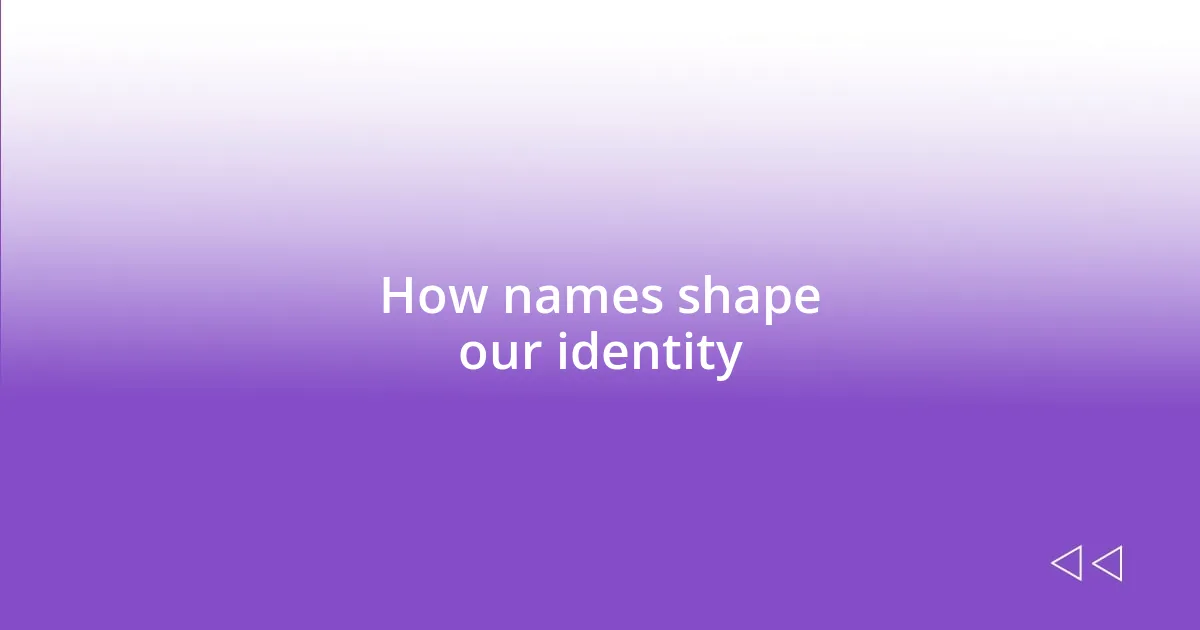Key takeaways:
- Names carry deep meanings tied to culture, history, and personal identity, influencing self-perception and how others see us.
- Understanding the origins and significance of names can foster a sense of pride and connection to heritage, shaping our identities and relationships.
- Cultural influences play a crucial role in naming traditions, reflecting family values and societal narratives that shape individual identities.
- Embracing the uniqueness of one’s name can empower individuals, encouraging deeper connections and conversations about identity and personal history.

Understanding the meaning of names
Names are more than just labels; they often carry deep meanings tied to culture, history, and identity. I remember when I learned the origin of my name—it comes from an ancient word meaning “bringer of light.” This realization sparked a sense of pride within me, as it felt like a reflection of my optimistic nature and ambition. Have you ever thought about how your name might embody your qualities or aspirations?
Growing up, I often asked my parents why they chose my name. Their responses revealed not only the significance behind it but also how they hoped it would guide me through life. It’s fascinating to think that a name can influence our perceptions of ourselves and how others perceive us. Isn’t it interesting how a simple combination of letters can evoke feelings of belonging or even pressure to live up to certain expectations?
In various cultures, names also serve as a connection to heritage and family traditions. For example, I once met someone whose name was passed down through generations, a testament to their family’s legacy. Sharing that connection added a layer of depth to our friendship—don’t you think it’s incredibly meaningful when a name carries a story? Engaging with the meaning of our names can open up a valuable dialogue about who we are and where we come from.

How names shape our identity
Names play a crucial role in shaping our identities, intertwining with our experiences and perceptions. I vividly recall the day a teacher mispronounced my name, accidentally transforming it into something completely different. That moment, while embarrassing, made me acutely aware of how our names influence how others perceive us. When people get my name right, I feel seen; when they don’t, it feels like a thin veil veiling my true self.
- Our names often carry unique cultural and familial significance.
- They can evoke a sense of pride, responsibility, or even anxiety.
- A name has the power to connect us to a larger narrative, one that encompasses heritage, hopes, and dreams.
- Sometimes, names can act as a framework, shaping how we view ourselves and how we want others to perceive us.
- Experiences related to our names can deepen our understanding of who we are, highlighting the dynamic relationship between identity and the labels we carry.
Reflecting on the stories behind names can foster a profound connection with ourselves and those around us. It’s truly fascinating how a name, with all its emotional and personal weight, can signal so much about our identities and the paths we choose.

The significance of name origins
Names have fascinating origins that often reveal much about our heritage and culture. I recall my grandmother sharing the story of her name, which was derived from a Hebrew word meaning “life.” Such an origin provided me a glimpse into the values she held dear, emphasizing how names can echoed generations of tradition. It’s a comforting thought, isn’t it, knowing that our names can serve as a bridge connecting us to our past?
The origins of a name can also suggest unique qualities that parents hope to instill in their children. For instance, a friend of mine chose to name their daughter Echo, inspired by the mythological figure known for her resilience and strength. The intention behind that name resonated deeply with me. It made me wonder how often names set the stage for expectations, both personally and socially.
Exploring name origins can be a profound journey, one that can deepen our understanding of ourselves. I’ve seen how understanding these beginnings can empower people to embrace their identities more fully. Have you explored the roots of your name? It can lead to revelations about who you are and create a sense of purpose you might have never considered.
| Name Origin | Meaning |
|---|---|
| Sophia | Wisdom |
| Leo | Lion, bravery |
| Aisling | Dream, vision |

Cultural influences on naming
Cultural influences on naming are profound and varied across societies. Each culture often has traditions that dictate how names are chosen, reflecting values, beliefs, or history. For example, in some African cultures, names are given based on the circumstances surrounding a child’s birth, creating a narrative woven into their identity. Have you ever considered how the meaning behind your name could tell a story about your family’s values or experiences?
I’ve always been intrigued by the significance of names in different cultures, especially the way they can symbolize traits that parents hope to pass down. There’s a beautiful tradition in certain Asian cultures to name a child after a relative, honoring their legacy while keeping family ties strong. Imagine holding the weight of generations in just a single name. It certainly makes me appreciate my own name more, knowing the thoughtfulness that could lie behind it.
Moreover, names can serve as markers of cultural identity. I recall meeting individuals whose names were expressions of their cultural heritage, often sparking conversations about their backgrounds. When someone hears a name rich with cultural meaning, it can create an immediate connection, making me wonder—how often do names help us bridge gaps between diverse backgrounds? This idea truly emphasizes how our names do more than define us; they reflect a tapestry of influence, tradition, and identity that shapes who we are.

Personal experiences related to names
Growing up, I often felt my name was a source of pride but also a burden. My name, which is quite uncommon in my community, sparked curious glances at school. While some teased me for being “different,” it also opened doors to rich conversations about my family’s history and the origins of my name, providing a touchstone for my identity that I learned to embrace over time.
I vividly remember the time I traveled abroad and met someone with a name that mirrored my own almost perfectly. We bonded over that shared experience, and it led to an in-depth discussion about how our names shaped our perceptions of ourselves in entirely different cultures. Isn’t it fascinating how a simple name can create instant camaraderie? It’s a reminder that names carry stories and resonate beyond borders.
Reflecting on the impact of my name, I’ve realized it shaped my self-perception in unexpected ways. It was during a college presentation, where I had to introduce myself to a diverse group, that I truly understood its significance. I mentioned the meaning of my name and watched as my audience leaned in, intrigued. That moment underscored how names can spark interest and carry weight—they are often our first introduction to the world, and they can evoke pride, curiosity, or even vulnerability. Have you ever noticed how your name influences your interactions? It’s a powerful realization that can redefine how we view ourselves and connect with others.

Embracing your name’s representation
Embracing the representation of your name can be a transformative experience. I remember when my grandmother shared the origin of my first name and how it was chosen as a tribute to her own mother. That connection infused my identity with a sense of history I hadn’t appreciated before—it felt like I was carrying a piece of my family’s legacy with me.
There was a time when I hesitated to introduce myself, wishing my name was easier to pronounce. But as I grew older, I started to celebrate its uniqueness instead. Each time I corrected someone, I saw it as an opportunity to share the story behind my name. It’s amazing how that simple shift in perspective made me feel more empowered and proud of my roots.
Have you ever thought about how your name can act as a bridge in conversations? I’ve found that when I share the meaning and significance behind my name, others often open up about theirs in return. It creates a space for connection and understanding, reminding us that our names are more than labels—they carry weighty histories and reflections of our cultural identities. By embracing what our names represent, we can foster deeper relationships and a stronger sense of self.














